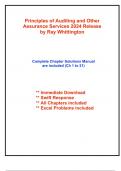Principles of Auditing and Other
Assurance Services 2024 Release
by Ray Whittington
Complete Chapter Solutions Manual
are included (Ch 1 to 21)
** Immediate Download
** Swift Response
** All Chapters included
** Excel Problems included
,Table of Contents are given below
Chapter 1: The Role of the Public Accountant in the American Economy
Chapter 2: Professional Standards
Chapter 3: Professional Ethics
Chapter 4: Legal Liability of CPAs
Chapter 5: Audit Evidence and Documentation
Chapter 6: Audit Planning, Understanding the Client, Assessing Risks, and Responding
Chapter 7: Internal Control
Chapter 8: Consideration of Internal Control in an Information Technology Environment
Chapter 9: Audit Sampling
Chapter 10: Cash and Financial Investments
Chapter 11: Accounts Receivable, Notes Receivable, and Revenue
Chapter 12: Inventories and Cost of Goods Sold
Chapter 13: Property, Plant, and Equipment: Depreciation and Depletion
Chapter 14: Accounts Payable and Other Liabilities
Chapter 15: Debt and Equity Capital
Chapter 16: Auditing Operations and Completing the Audit
Chapter 17: Auditors' Reports
Chapter 18: Integrated Audits of Public Companies
Chapter 19: Additional Assurance Services: Historical Financial Information
Chapter 20: Additional Assurance Services: Other Information
Chapter 21: Internal, Operational, and Compliance Auditing
,Solutions Manual organized in reverse order, with the last chapter
displayed first, to ensure that all chapters are included in this document.
(Complete Chapters included Ch21-1)
CHAPTER 21
Internal, Operational and
Compliance Auditing
Review Questions
21-1 Internal auditing may be defined as an independent, objective assurance and consulting activity
designed to add value and improve an organization’s operations. It helps an organization
accomplish its objectives by bringing a systematic, disciplined approach to evaluate and
improve the effectiveness of risk management, control, and governance processes. AICPA
and PCAOB auditing standards state that one aspect of an organization's control environment is
management's control methods for monitoring and following up on performance, including internal
auditing.
21-2 The scope of internal auditing has evolved from a primary concern with financial controls to a scope
that includes:
(4) Reviewing and evaluating all types of internal controls,
(5) Evaluating the organization’s risk assessment processes,
(6) Making recommendations regarding the organization’s system of governance, and
(7) Performing other assurance and consulting services for the benefit of management.
21-3 Internal auditing has evolved to meet the needs of business, government, and nonprofit organizations.
Initially, internal auditors supplemented the work of the independent auditors by helping to ensure the
accuracy of the organization's financial information. However, as organizations became more
complex, operational controls became more important, and the scope of the internal auditors' work
expanded to include evaluating and testing financial and operational controls.
The enactment of the Foreign Corrupt Practices Act also expanded the demand for internal
auditing activities. The accounting provisions of the act require public companies to establish and
maintain effective internal accounting controls. An internal auditing function helps to ensure that a
company complies with these provisions.
The Report of the National Commission on Fraudulent Financial Reporting included a
recommendation that public companies establish and maintain an internal auditing function staffed
with appropriately qualified personnel and fully supported by top management.
, Finally, the Sarbanes-Oxley Act of 2002 prohibits auditors from performing internal audit
services for public-company audit clients. This has increased the demand for internal auditors.
21-4 In addition to knowledge and skills about accounting and auditing, modern internal auditing requires
knowledge in such disciplines as economics, law, finance, statistics, computer processing,
engineering, and taxation.
21-5 This statement is false. The scope of the work of independent auditors is generally confined to the
audit of the organization's financial statements and, possibly, performing other attestation services
such as examining internal controls over financial reporting. Therefore, independent auditors are
primarily concerned with only those controls that affect the reliability of the organization's financial
statements. The work of the internal auditors encompasses evaluation of all financial, compliance,
and operating policies and procedures. Many progressive internal auditing departments also perform
operational audits for the organization to evaluate the efficiency and effectiveness of various
operating units, and a broad range of other assurance and consulting services for management.
21-6 The external auditors' objectives are to perform an audit of the organization's financial statements and
to express an opinion on those statements. In auditing the financial statements, the external auditors
will consider those controls that affect the reliability of the financial information included in the
financial statements. For a public company, they may also be engaged to examine the management’s
assertion about the reliability of internal controls over financial reporting. Internal auditors are
concerned with all controls, regardless of whether they are financial, compliance, or operational.
They appraise the effectiveness and efficiency of the operating segments throughout the organization.
21-7 The eleven general categories of the IIA's Standards for the Professional Practice of Internal
Auditing include:
(1) Purpose, Authority, and Responsibility
(2) Independence and Objectivity
(3) Proficiency and Due Professional Care
(4) Quality Assurance and Improvement Program
(5) Managing the Internal Audit Activity
(6) Nature of Work
(7) Engagement Planning
(8) Performing the Engagement
(9) Communicating Results
(10) Monitoring Progress
(11) Communicating the Acceptance of Risks
21-8 The statement is false. Since internal auditors are employees of the organization, they cannot be
independent of the organization itself. However, when the organizational status of the director of
internal auditing is appropriate, and individual internal auditors are assigned to audit activities with
which they have no conflicts of interest, the internal auditors can certainly be independent of the
activities that they audit.




